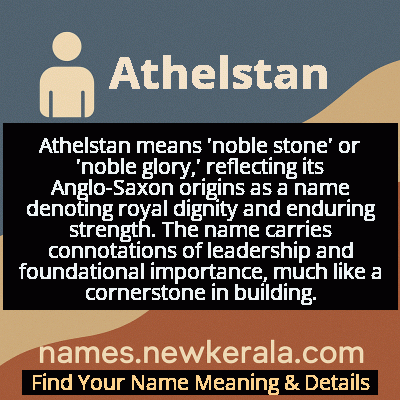Athelstan Name Meaning & Details
Origin, Popularity, Numerology Analysis & Name Meaning of Athelstan
Discover the origin, meaning, and cultural significance of the name ATHELSTAN. Delve into its historical roots and explore the lasting impact it has had on communities and traditions.
Name
Athelstan
Gender
Male
Origin
Anglo
Lucky Number
1
Meaning of the Name - Athelstan
Athelstan means 'noble stone' or 'noble glory,' reflecting its Anglo-Saxon origins as a name denoting royal dignity and enduring strength. The name carries connotations of leadership and foundational importance, much like a cornerstone in building.
Athelstan - Complete Numerology Analysis
Your Numerology Number
Based on Pythagorean Numerology System
Ruling Planet
Sun
Positive Nature
Leaders, ambitious, highly driven, self-reliant, innovative.
Negative Traits
Overly aggressive, domineering, impatient, selfish.
Lucky Colours
Red, orange, gold.
Lucky Days
Sunday.
Lucky Stones
Ruby, garnet.
Harmony Numbers
2, 3, 9.
Best Suited Professions
Entrepreneurs, managers, engineers.
What People Like About You
Courage, determination, leadership.
Famous People Named Athelstan
Æthelstan
King of England
First King of all England, established unified English monarchy
Æthelstan Half-King
Ealdorman of East Anglia
Powerful regent and advisor during formative years of English kingdom
Athelstan of Hereford
Bishop
Last Anglo-Saxon Bishop of Hereford before Norman Conquest
Athelstan Riley
Writer and Hymnologist
Influential Anglican writer and hymn composer
Name Variations & International Equivalents
Click on blue names to explore their detailed meanings. Gray names with will be available soon.
Cultural & Historical Significance
The name embodies the cultural and political aspirations of the Anglo-Saxon period, symbolizing nobility, leadership, and the establishment of English national identity. In literature and historical tradition, Athelstan represents the ideal of Christian kingship and the unification of disparate Anglo-Saxon kingdoms against Viking invaders. The name's continued use in modern times reflects a connection to England's ancient heritage and serves as a reminder of the nation's foundational monarchical traditions. The legacy of King Athelstan established patterns of governance, law, and cultural identity that would influence English development for generations, making the name synonymous with the very concept of English nationhood.
Extended Personality Analysis
Individuals named Athelstan are typically perceived as possessing strong leadership qualities, intellectual depth, and a sense of historical gravitas. They often exhibit natural authority, strategic thinking, and the ability to unite people toward common goals, reflecting the name's royal heritage. These individuals tend to be principled, with a strong moral compass and a sense of duty that guides their decisions and actions. There's often a contemplative quality to Athelstans, combined with decisive action when required.
Athelstans are often characterized by their resilience, determination, and capacity for long-term planning. They typically possess a blend of traditional values and forward-thinking vision, making them effective in positions of responsibility. Their personality often includes a scholarly or intellectual dimension, combined with practical wisdom and the ability to navigate complex situations with grace and authority. The name suggests someone who commands respect through competence rather than force, embodying the ideal of servant leadership. This combination of intellectual depth and practical effectiveness makes Athelstans particularly suited to roles requiring both vision and execution.
Modern Usage & Popularity
In contemporary times, Athelstan remains a rare but meaningful choice, primarily used by parents seeking a name with deep historical roots and distinctive character. The name has experienced a modest revival in recent decades, particularly in the United Kingdom and among history enthusiasts, though it remains outside the top 1000 names in most English-speaking countries. Its usage is often motivated by a desire to honor Anglo-Saxon heritage or appreciation for medieval history, with the name appealing to those who value tradition and uniqueness over current naming trends. The character Athelstan in popular television series like 'Vikings' has introduced the name to new audiences, potentially contributing to its gradual increase in recognition. While still uncommon, the name's distinctive sound and rich historical associations make it an appealing choice for parents seeking something both traditional and unusual.
Symbolic & Spiritual Meanings
Symbolically, Athelstan represents the foundation of unity, the strength of tradition, and the enduring nature of leadership. The name carries connotations of stability and permanence, much like a cornerstone or foundation stone upon which something greater is built. It symbolizes the bridging of different cultures and the creation of harmony from diversity, reflecting King Athelstan's historical role in uniting various Anglo-Saxon kingdoms. The name embodies the concept of building something lasting from disparate elements.
Metaphorically, Athelstan embodies the concept of noble endurance - the idea that true strength lies in wisdom, principle, and the ability to create lasting institutions. The name suggests a person who serves as an anchor or foundation for others, providing stability and guidance. It represents the marriage of intellectual depth with practical leadership, symbolizing the ideal balance between contemplation and action that characterizes effective rulership and meaningful influence. The name evokes images of steadfastness in the face of challenge and the wisdom to build rather than simply conquer.

